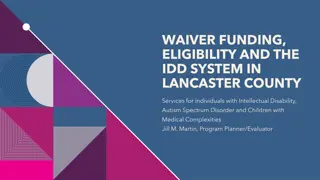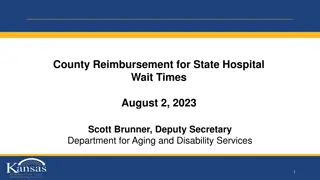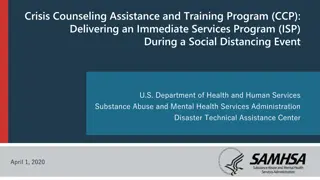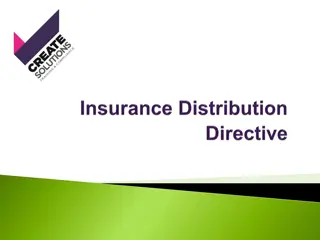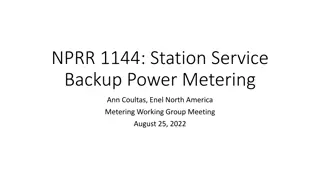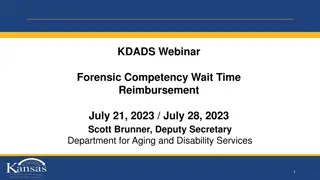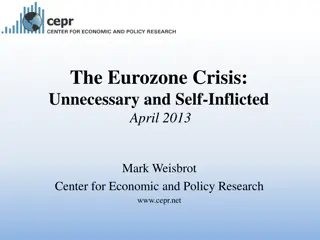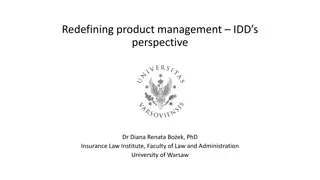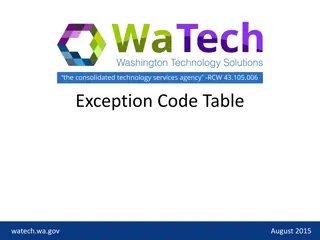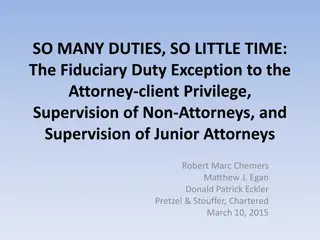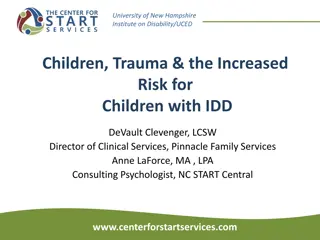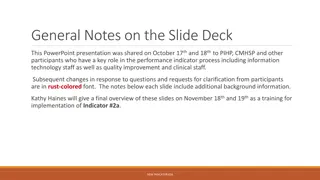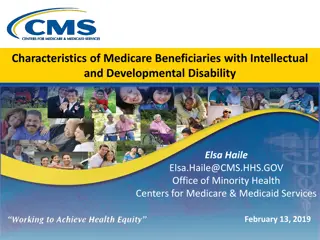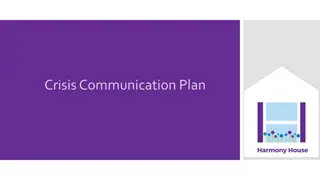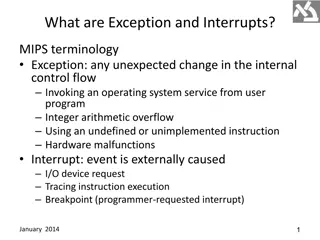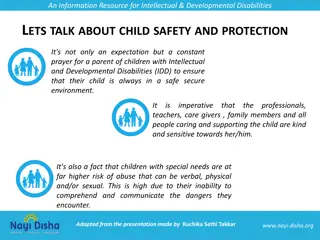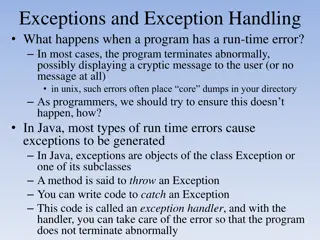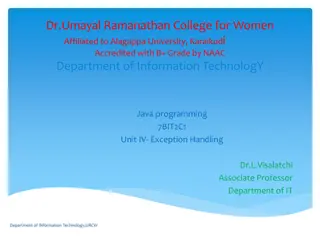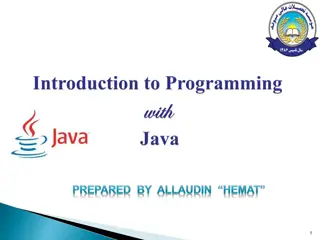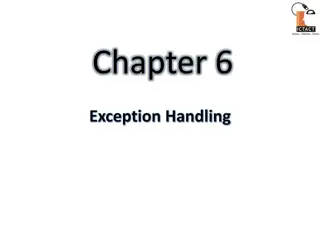KDADS IDD Crisis Exception Training Overview
This document provides an overview of the KDADS IDD Crisis Exception Training held on October 28, 2020. It includes information on the agenda, purpose of the training, review of the current process, and policies related to crisis exceptions in IDD programs. The training aimed to streamline the crisis-exception process and ensure compliance with eligibility requirements and documentation. Key components such as current process review, policy E2016-119, and criteria for crisis exceptions are discussed in detail.
Download Presentation

Please find below an Image/Link to download the presentation.
The content on the website is provided AS IS for your information and personal use only. It may not be sold, licensed, or shared on other websites without obtaining consent from the author. Download presentation by click this link. If you encounter any issues during the download, it is possible that the publisher has removed the file from their server.
E N D
Presentation Transcript
KDADS IDD Crisis-Exception Training October 28, 2020 IDD Program Manager: Paula Morgan HCBS Project Manager: LaTonia Wright
Agenda Introductions CDDO Roll Call Purpose of Training Review of Current Process -Policy E2016-119 Questions About Current Process Suggestion for Process Improvement July 18, 2024
Purpose What we want to do: -Review current process -Discuss concerns/issues with current process Why we are doing it: -Streamline the crisis-exception process July 18, 2024
Review of Current Process Person/Person s representative or TCM initiates contact with CDDO. Case Outreach/Referral to MCO for people assigned to a MCO should also be occurring Prior to crisis-exception request submission, person must have current functional assessment on file Crisis-exception request presented to CDDO for review KDADS reviews request within 10 business days. If request is missing information or documentation, outreach to CDDO. CDDO documents returned request in Quarterly report CDDO reviews. If CDDO approves, sends to KDADS. If CDDO denies, CDDO sends notification and appeal rights If KDADS approves, an NOA and a 3160 are sent. If KDADS denies, an NOA with appeal rights is sent to person July 18, 2024
Policy E2016-119 General Individuals requesting an exception must meet IDD eligibility determination standards and functional eligibility requirements Requests for crisis-exceptions are made through the CDDO in the area in which the person resides Crisis-Exception requests are uploaded into the IDD Utility Upload Person must have current assessment prior to submission of a crisis request July 18, 2024
Policy E2016-119 Criteria and Required Documentation Criteria 1: Confirmed Abuse, Neglect or Exploitation Documentation: ANE substantiation by DCF will be provided to the appropriate CDDO by KDADS Program Integrity Official Law Enforcement documentation Criteria 2: Significant, imminent risk of serious harm to self and others Substantiating Documentation July 18, 2024
Policy E2016-119 Required Supporting Documentation Submitted by the CDDO CDDO Notification form PPOC, with section #4 completed Current PCSP that demonstrates need If the person requesting services does not currently have a PCSP one shall be completed within 30 days of approval for waiver access. Current Behavior assessment, behavior support plan, or behavior management plan as applicable Supporting documentation of crisis-exception that is being requested (see previous slide) CDDO crisis review documentation from crisis review committee; Documentation that community resources have been exhausted prior to submission of crisis to KDADS Consumer/consumer representative s signature of consent for crisis request MCO statement of resources exhausted July 18, 2024
Exhausting Community Resources: Examples Center for Independent Living (CIL)-5 core free services (independent skill building, advocacy, peer supports ) VR: employment Mental Health services Parsons DDTTS (behavioral supports) SACK: rights/responsibilities, advocacy Church Family/extended family EPSDT (0-21, active Medicaid card) Phone apps/Technology MCO VABs Private Pay CDDO State Aid CML DCF Childcare July 18, 2024
MCO Recommendations For a person assigned to a MCO, outreach by the TCM to the MCOs for the MCO review of resources exhausted by a MCO is required before any crisis request submission to KDADS. In the event that the person doesn t have a TCM, outreach needs to be made by the CDDO. Email Subject IDD Crisis Request: UHC: uhcksltss@uhc.com Sunflower: ltss@sunflowerhealthplan.com and KSLifeshare@sunflowerhealthplan.com Aetna: aetnabetterhealthKSHCBS_LTSS@aetna.com July 18, 2024
Policy E2016-119 Qualifying situations for Exceptions Persons in DCF Custody for the purpose of addressing non-supervision support needs related specifically to the person s IDD disability support needs. Persons determined to be at imminent risk of coming into custody of DCF. Documentation from DCF/courts will be required in order to justify this exception. Persons under the age of 18 transitioning from DCF custody. Documentation from DCF/courts (Journal Entry) will be required to justify this exception. Persons transitioning from DCF custody age 18 or older. DCF/court documentation (Journal Entry) required to justify this exception. Persons transitioning from Vocational Rehabilitation Services (VRS) which require ongoing support to maintain employment and self-sufficiency. Documentation from VRS required in order to justify this exception: VRS closure letter indicating extended plan/ongoing support needs. Persons meeting the criteria set forth in the KDADS Military Inclusion Policy. See Military Inclusion policy for documentation requirements. Persons transitioning from a Psychiatric Residential Treatment Facility (PRTF). Documentation of the impending transfer from the PRTF will be required in order to justify this exception, if person doesn t meet criteria for Institutional Transition. Persons previously on the IDD waiver transferring back to the IDD waiver from the WORK program. Usually requires a new assessment for functional eligibility. Does not require the crisis-exception process. It has its own process. July 18, 2024
Transitions to the IDD Waiver Qualifying transitions to the HCBS IDD waiver program pending functional eligibility, upon impending closure of the first waiver due to person no longer being eligible for that waiver: BI to IDD TA to IDD AU to IDD Institutional Transitions (post MFP) When the IDD waiver is the most appropriate considering the person s health and safety, upon KDADS approval (more rare). July 18, 2024
Transition Process Waiver to Waiver Respective Program Manager sends NOA to person. IDD Program Manager, MCO, DCF (if CIC) emailed copy of NOA. Consultation between KDADS Program Managers IDD Program Manager coordinates with CDDO to determine person s program and functional eligibility Person no longer eligible for TA, Autism or BI waiver Once program and functional eligibility is established, IDD Program Manager sends NOA to person, copies MCO, CDDO, and DCF (if CINC) 3160 indicating access is sent by KDADS to Clearinghouse, CDDO, DCF (if CINC) and MCO. July 18, 2024
ADDITIONAL GUIDANCE WORKING AS A TEAM FOR THE PERSON: TCM/MCO COMMUNICATION PRE CRISIS-EXCEPTION REQUEST: THE EARLIER THAT THE TCM CAN START COMMUNICATION WITH THE MCO ON THE CASE AND SITUATION IS VITAL. TCM SHOULD NOT BE CONTACTING THE MCO RIGHT BEFORE SUBMITTING A REQUEST TO THE CDDO, BUT SHOULD BE WORKING WITH THE MCO ON THE NEEDS OF THE PERSON ON A REGULAR BASIS. SHARING OF RESOURCES EXHAUSTED: MCO EDUCATING TCM/CDDO ON RESOURCES AVAILABLE DISCUSSION: CONCERNS THAT THE MCOS, THE TCMS AND THE CDDOS HAVE FOR THIS PART OF THE PROCESS DISCUSSION: REQUEST MUST CLEARLY SHOW HOW PERSON IS TRULY IN CRISIS: CRISIS DEFINITION DOCUMENTATION WAITLIST (9 YEAR) RESOURCES July 18, 2024
Questions? July 18, 2024
Process Improvement Ideas? July 18, 2024
Thank you for your participation and input. July 18, 2024



